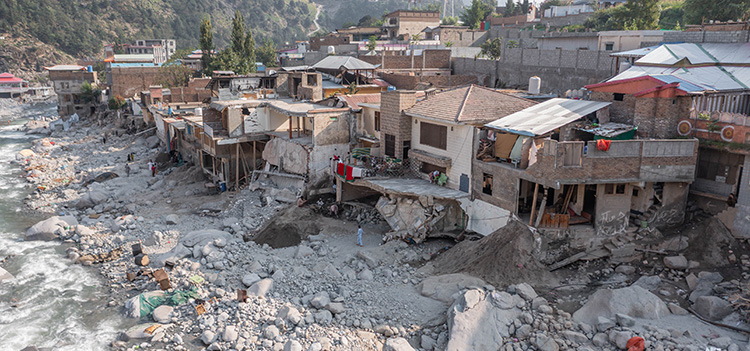
Swat, 13 September 2022 – The floodwaters have passed the Swat valley, leaving an impact deep enough to be felt for a long time.
Signs of the damage mark the valley, where homes along the river have been reduced to debris and bridges reduced to piles of rubble, highlighting the insignificance of the structures in the face of the climate's wrath.
Even the most popular tourist site for tea and pakoras is unrecognizable now. A mere two months ago, it was crowded with tourists who would stop here for a cup of tea and to fill their bottles with spring water. The only way you know this is the same place is when someone tells you. There are no signs left of its former life.
"It is painful to see these signs of suffering. The rains have stopped and the floods have passed, but these sites along the river tell the story of pain felt by the people of this land," said Dr Palitha Mahipala, WHO Representative in Pakistan, during his visit to Swat on Thursday 8 September. "The impact will remain for months, if not years."
The WHO Representative, along with other WHO staff, visited local health centres to understand the needs on the ground. During his visit to Maidan Hospital, Dr Mahipala sat with the administration team to hear about the challenges being faced in providing access to health care.
For immediate needs, WHO has donated vehicles and essential medicines, and is looking into the possibility of equipping health centres with solar power to ensure an uninterrupted power supply as the need for health care increases.
WHO has also donated essential equipment such as operation theater lights and anesthesia machines and has set up an emergency operations centre to be the central hub for disseminating water purification tablets, vaccines and nutritional supplements.
Visiting the new emergency operations centre, Dr Mahipala emphasized the importance of vaccinating children against preventable diseases, as displacement heightens the health risks of the most vulnerable.
"My greatest concern is for women and children. So many areas are still disconnected within Swat. The nutrition and health needs are tremendous," Dr Mahipala said.
"We must ensure that Pakistan and its people continue to be remembered worldwide. The scale of the country's humanitarian needs is unimaginable," he added.


